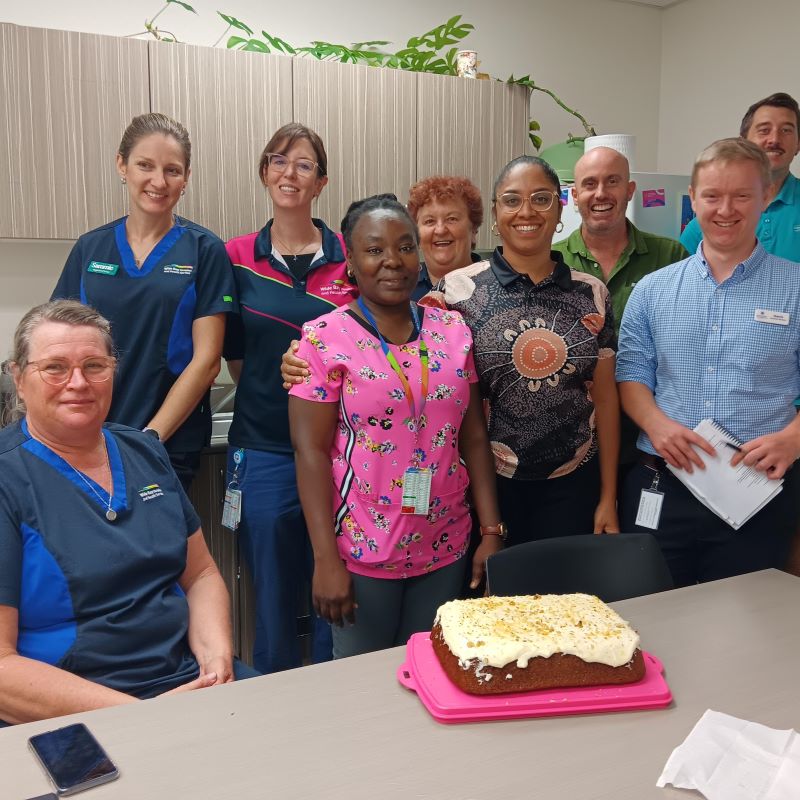
Marking the one-year anniversary of the Drug and Alcohol Brief Intervention Team (DABIT) in the Bundaberg Hospitals Emergency department was a celebration of achievements.
What started as a team of one has become a vital support system for individuals facing alcohol and drug-related challenges.
DABIT Nurse Theresa Oke said over the over the past year, she has witnessed firsthand the impact that compassionate, evidence-based interventions can have in moments of crisis.
“In the fast-paced environment of the Emergency Department where time is limited, and the needs are urgent, this service has provided essential care, guidance, and harm-reduction strategies to countless individuals,” she said.
“One of the most significant aspects of this work has been educating and supporting individuals with alcohol dependence, ensuring they receive the right information and treatment to reduce harm.
“Many may not realise that long-term alcohol use can lead to severe neurological conditions such as Wernicke’s encephalopathy.
“That’s why we emphasise the daily use of Thiamine (Vitamin B1) as a simple but crucial step in preventing irreversible harm.”
Through brief interventions, the team has helped patients recognise the risks of alcohol and other drug dependence and the importance of harm reduction. Patients can access Thiamine and other essential supports to prevent severe complications. They can connect with ongoing treatment and recovery services to break the cycle of crisis care.
Community Support & Partnerships
DABIT is incredibly grateful for the support of Blooms Pharmacy and Crofton Street Pharmacy, who have generously contributed bottles of Thiamine to give to patients.
“This initiative is not just about providing medication—it is about reminding patients of the importance of taking Thiamine daily and helping them protect their brain health,” Theresa said.
“This simple yet meaningful act reinforces the message that their health and well-being matters and that they are not alone in their journey.”
The importance of strong partnerships in delivering ongoing care is also recognised.
“We are excited about the newly opened Lives Lived Well Rehabilitation Centre in Bundaberg, which offers another crucial avenue for individuals seeking long-term recovery,” Theresa said.
“We hope to continue collaborating with them to ensure that individuals leaving the Emergency Department can access the wrap-around support and rehabilitation services they need to rebuild their lives.”
Theresa explained the success of the team’s work is only possible through collaboration with dedicated community partners.
“We are incredibly grateful to the Alcohol and Other Drugs (AOD) community, the Aboriginal Health Workers, Peer Workers, the Acute Care Team, and the Hospital Alcohol and Drug Service at RBWH,” she said.
“Their expertise, lived experience, and dedication to holistic care ensures that individuals receive culturally safe, peer-supported, and clinically informed interventions that truly make a difference.
“Together, we are breaking down stigma and building a stronger, more connected support network for those affected by addiction.
“The success of this service is not measured in numbers but in the stories of individuals who left the Emergency Department feeling heard, supported, and equipped with tools to make positive changes.
“While the journey of recovery is not always linear, every conversation, intervention, and act of care makes a difference.”
Moving forward the Drug and Alcohol Brief Intervention team hopes to expand its reach and strengthen partnerships.
“We’re grateful to everyone who has supported this initiative—whether through advocacy, collaboration or simply taking a moment to understand the challenges faced by those with substance dependence,” Theresa said.
“Your support fuels this mission, and together, we are building a healthier, more compassionate community.
“Here’s to another year of impact, growth, and unwavering commitment to helping people when they need it most.”